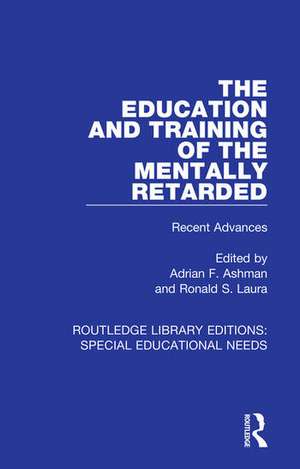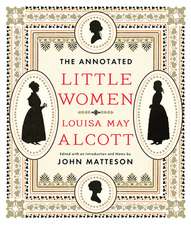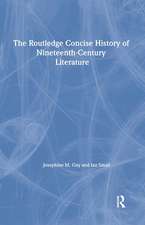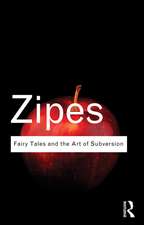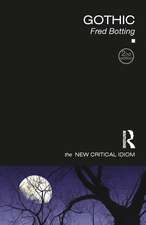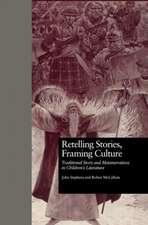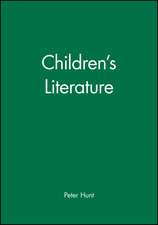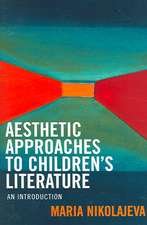Routledge Library Editions: Special Educational Needs: Routledge Library Editions: Special Educational Needs
Autor Variousen Limba Engleză Hardback – 16 aug 2018
Din seria Routledge Library Editions: Special Educational Needs
-
 Preț: 273.74 lei
Preț: 273.74 lei -
 Preț: 336.25 lei
Preț: 336.25 lei -
 Preț: 336.25 lei
Preț: 336.25 lei -
 Preț: 336.25 lei
Preț: 336.25 lei -
 Preț: 356.18 lei
Preț: 356.18 lei -
 Preț: 336.25 lei
Preț: 336.25 lei -
 Preț: 336.25 lei
Preț: 336.25 lei -
 Preț: 336.25 lei
Preț: 336.25 lei -
 Preț: 238.04 lei
Preț: 238.04 lei -
 Preț: 356.18 lei
Preț: 356.18 lei - 34%
 Preț: 652.84 lei
Preț: 652.84 lei - 34%
 Preț: 708.55 lei
Preț: 708.55 lei - 18%
 Preț: 891.36 lei
Preț: 891.36 lei -
 Preț: 336.25 lei
Preț: 336.25 lei -
 Preț: 336.25 lei
Preț: 336.25 lei - 34%
 Preț: 625.03 lei
Preț: 625.03 lei -
 Preț: 336.25 lei
Preț: 336.25 lei - 18%
 Preț: 894.73 lei
Preț: 894.73 lei - 34%
 Preț: 652.84 lei
Preț: 652.84 lei - 33%
 Preț: 657.10 lei
Preț: 657.10 lei - 18%
 Preț: 782.44 lei
Preț: 782.44 lei - 34%
 Preț: 625.03 lei
Preț: 625.03 lei - 34%
 Preț: 596.31 lei
Preț: 596.31 lei -
 Preț: 327.01 lei
Preț: 327.01 lei -
 Preț: 336.25 lei
Preț: 336.25 lei -
 Preț: 336.25 lei
Preț: 336.25 lei - 34%
 Preț: 625.03 lei
Preț: 625.03 lei - 18%
 Preț: 781.64 lei
Preț: 781.64 lei -
 Preț: 336.25 lei
Preț: 336.25 lei -
 Preț: 327.82 lei
Preț: 327.82 lei - 34%
 Preț: 553.99 lei
Preț: 553.99 lei - 18%
 Preț: 695.65 lei
Preț: 695.65 lei -
 Preț: 356.18 lei
Preț: 356.18 lei - 18%
 Preț: 782.44 lei
Preț: 782.44 lei - 18%
 Preț: 891.36 lei
Preț: 891.36 lei
Preț: 14208.52 lei
Preț vechi: 21629.31 lei
-34% Nou
Puncte Express: 21313
Preț estimativ în valută:
2718.84€ • 2844.45$ • 2258.52£
2718.84€ • 2844.45$ • 2258.52£
Carte tipărită la comandă
Livrare economică 03-17 aprilie
Preluare comenzi: 021 569.72.76
Specificații
ISBN-13: 9781138585324
ISBN-10: 1138585327
Pagini: 10608
Dimensiuni: 156 x 234 x 281 mm
Greutate: 0.45 kg
Ediția:1
Editura: Taylor & Francis
Colecția Routledge
Seria Routledge Library Editions: Special Educational Needs
Locul publicării:Oxford, United Kingdom
ISBN-10: 1138585327
Pagini: 10608
Dimensiuni: 156 x 234 x 281 mm
Greutate: 0.45 kg
Ediția:1
Editura: Taylor & Francis
Colecția Routledge
Seria Routledge Library Editions: Special Educational Needs
Locul publicării:Oxford, United Kingdom
Public țintă
General, Postgraduate, Professional, and UndergraduateCuprins
1. The Education and Training of the Mentally Retarded: Recent Advances Edited by Adrian F. Ashman and Ronald S. Laura (1985) 2. Teaching the Literacy Hour in an Inclusive Classroom: Supporting Pupils with Learning Difficulties in a Mainstream Environment Edited by Ann Berger and Jean Gross (1999) 3. Shaping the Education of Slow Learners Wilfred Kayran Brennan (1974) 4. Curricular Needs of Slow Learners Wilfred Kayran Brennan (1979) 5. Reading for Slow Learners: A Curriculum Guide Wilfred Kayran Brennan (1978) 6. Towards Inclusive Schools? Edited by Catherine Clark, Alan Dyson and Alan Millward (1995) 7. The Assessment of Special Educational Needs: International Perspective Edited by Tony Cline (1992) 8. A Struggle for Choice: Students with Special Needs in Transition to Adulthood Jenny Corbett and Len Barton (1992) 9. Choice, Opportunity and Learning: Educating Children and Young People Who Are Physically Disabled John Cornwall (1996) 10. Whose Choice?: Contentious Issues for Those Working with People with Learning Difficulties Edited by Judith Coupe O'Kane and Juliet Goldbart (1996) 11. The Education of Children with Severe Learning Difficulties: Bridging the Gap between Theory and Practice Edited by Judith Coupe and Jill Porter (1986) 12. Taking Control: Enabling People with Learning Difficulties Edited by Judith Coupe-O'Kane and Beryl Smith (1994) 13. At the Crossroads: Special Educational Needs and Teacher Education Edited by John Dwyfor Davies and Philip Garner (1997) 14. Managing Special Needs in Mainstream Schools: The Role of the SENCO Edited by John Dwyfor Davies, Philip Garner and John Lee (1998) 15. Special Needs in the Secondary School: The Whole School Approach Joan Dean (1989) 16. Rethinking Special Needs in Mainstream Schools: Towards the Year 2000 Edited by Alan Dyson and Charles Gains (1993) 17. The Education of Dual Sensory Impaired Children: Recognising and Developing Ability Edited by David Etheridge (1995) 18. The Visually Impaired: Curricular Access and Entitlement in Further Education Edited by David Etheridge and Heather Mason (1994) 19. Special Education and Social Control: Invisible Disasters Julienne Ford, Denis Mongon and Maurice Whelan (1982) 20. Deaf Students in Postsecondary Education Edited by Susan B. Foster and Gerard G. Walter (1992) 21. Autistic Children: Teaching, Community and Research Approaches Edited by Barbara Furneaux and Brian Roberts (1977) 22. Children on Medication Volume I: Hyperactivity, Learning Disabilities, and Mental Retardation Kenneth D. Gadow (1986) 23. Children on Medication Volume II: Epilepsy, Emotional Disturbance, and Adolescent Disorders Kenneth D. Gadow (1986) 24. Schools, Pupils and Special Educational Needs David Galloway (1985) 25. Advocacy, Self-Advocacy and Special Needs Edited by Philip Garner and Sarah Sandow (1995) 26. A Basic Attainments Programme for Young Mentally Handicapped Children Bill Gillham (1987) 27. Problem Behaviour in the Secondary School: A Systems Approach Edited by Bill Gillham (1981) 28. Self-Esteem in Children with Special Educational Needs Peter W. Gurney (1988) 29. Special Needs in Ordinary Classrooms: From Staff Support to Staff Development Gerda Hanko (1995) 30. Learning Disabilities in the Primary Classroom Leonora Harding (1986) 31. Language Development in Schools for Children with Severe Learning Difficulties John Harris (1988) 32. New Information Technology in the Education of Disabled Children and Adults David Hawkridge, Tom Vincent and Gerald Hales (1985) 33. Learning Difficulties in Primary Classrooms: Delivering the Whole Curriculum Edited by Kevin Jones and Tony Charlton (1992) 34. Moral Issues in Mental Retardation Edited by Ronald S. Laura and Adrian F. Ashman (1985) 35. Teaching Language and Communication to the Mentally Handicapped Ken Leeming, Will Swann, Judith Coupe and Peter Mittler (1979) 36. Screening for Children with Special Needs: Multidisciplinary Approaches Edited by Geoff Lindsay (1984) 37. Teaching Special Needs: Strategies and Activities for Children in the Primary Classroom Sylvia McNamara and Gill Moreton (Blenco) (1993) 38. Teaching Plans for Handicapped Children Franz Morgenstern (1981) 39. The Quality of Learning: An Essay Concerning the Education of Dull Children Ronald Morris (1951) 40. Special Education Integration in Europe Christine O'Hanlon (1993) 41. Young Gifted Children: Identification, Programming and Socio-Psychological Issues Edited by John T. Pardeck and John W. Murphy (1990) 42. Special Kids for Special Treatment?: Or how special do you need to be to find yourself in a special school? Helen Phtiaka (1997) 43. Special Educational Needs Policy in the 1990s: Warnock in the Market Place Edited by Sheila Riddell and Sally Brown (1994) 44. Remedial Education Olive C. Sampson (1975) 45. Teacher Training and Special Educational Needs Edited by John Sayer and Neville Jones (1985) 46. Redefining the Whole Curriculum for Pupils with Learning Difficulties Judy Sebba, Richard Byers and Richard Rose (1995) 47. Developing Holistic Education: A Case Study of Raddery School for Emotionally Damaged Children Philip Seed (1992) 48. Prospects for People with Learning Difficulties Edited by Stanley S. Segal and Ved P. Varma (1991) 49. Coping with Special Needs: A Guide for New Teachers Geof Sewell (1986) 50. Reshaping Remedial Education Geof Sewell (1982) 51. Special Education: A Source Book Manny Sternlicht with Madeline Sternlicht (1987) 52. Understanding Children with Special Needs Lynn Stow and Lorna Selfe (1989) 53. The Education of Slow Learning Children A. E. Tansley and Ronald Gulliford (1960) 54. Teaching Pupils with Severe Learning Difficulties: Practical Approaches Edited by Christina Tilstone (1991) 55. Educational Subnormality: A Study in Decision-Making Sally Tomlinson (1981) 56. Staff Training and Special Educational Needs Edited by Graham Upton (1991) 57. Special Education in Britain after Warnock Edited by John Visser and Graham Upton (1993) 58. Teacher Research and Special Education Needs Edited by Graham Vulliamy and Rosemary Webb (1992) 59. My Language, Our Language: Meeting Special Needs in English 11-16 Bernadette Walsh (1989) 60. Educating Children with Profound and Multiple Learning Difficulties Edited by Jean Ware (1994) 61. Teaching Children with Severe Learning Difficulties: A Radical Reappraisal Sue Wood and Barbara Shears (1986) 62. Problem Behaviour and People with Severe Learning Disabilities: The S.T.A.R Approach Ewa Zarkowska and John Clements (1994)
Descriere
This set of 62 volumes, originally published between 1951 and 1999, amalgamates a wide breadth of literature on Special Educational Needs, with a particular focus on inclusivity, class management and curriculum theory.
Notă biografică
Various authors.
Original Series Editors:
David Canter is Emeritus Professor at The University of Liverpool, UK. Having set up the first MSc in Environmental Psychology at The University of Surrey in 1972, he went on to establish the Journal of Environmental Psychology in 1980, editing it for 20 years. Soon after he founded the International Association of People-Environment Studies (IAPS). David has published widely on many aspects of human interactions with their surroundings; his 1977 book The Psychology of Place, being one of the most cited publications in the area.
David Stea is Professor Emeritus of Geography and International Studies at Texas State University and Research Associate with the Center for Global Justice in Mexico. As Carnegie Interdisciplinary Fellow at Brown University from 1964 to 1966, he developed the new field of Environmental Psychology and the related study of spatial and geographic cognition. David is a member of the editorial boards of a number of journals, the co-author or co-editor of several books and author of some 150 articles and book chapters on various subjects, including sustainable development and environmental issues in Latin America. In 1987 he was nominated for the Right Livelihood Prize (also known as the “alternative Nobel”) for his international work with indigenous peoples.
Original Series Editors:
David Canter is Emeritus Professor at The University of Liverpool, UK. Having set up the first MSc in Environmental Psychology at The University of Surrey in 1972, he went on to establish the Journal of Environmental Psychology in 1980, editing it for 20 years. Soon after he founded the International Association of People-Environment Studies (IAPS). David has published widely on many aspects of human interactions with their surroundings; his 1977 book The Psychology of Place, being one of the most cited publications in the area.
David Stea is Professor Emeritus of Geography and International Studies at Texas State University and Research Associate with the Center for Global Justice in Mexico. As Carnegie Interdisciplinary Fellow at Brown University from 1964 to 1966, he developed the new field of Environmental Psychology and the related study of spatial and geographic cognition. David is a member of the editorial boards of a number of journals, the co-author or co-editor of several books and author of some 150 articles and book chapters on various subjects, including sustainable development and environmental issues in Latin America. In 1987 he was nominated for the Right Livelihood Prize (also known as the “alternative Nobel”) for his international work with indigenous peoples.
Recenzii
“The timely re-issue of the prescient Ethnoscapes series provides an invaluable contribution to current concerns about built and natural environments. The breadth of coverage of these books, includes public participation in environmental modifications, the impact of housing design on the quality of life, cross-cultural comparisons of placemaking, and the role of building aesthetics on well-being, across many countries and contexts adds up to a treasure trove of innovative research. Now more than ever we need the benefit of the insights and findings of these scholars and professional (many of course who are both) who, over three decades, have studied crucial aspects of interactions between people and their surroundings.”
Ricardo García Mira, Professor of Social Psychology, University of A Coruna, Galicia, Spain. Former Spanish MP.
“The reissued volumes in the Ethnoscapes series were ground- breaking when they first appeared and remain fresh today. These books are essential for understanding how design and the use of space has cultural and human meaning that “artificial intelligence” could never achieve. They offer a vital and timely antidote to mind-numbing apology for the appropriation of civic space and corporate reproduction of McMansions and shopping malls.”
Ben Wisner, Honorary Visiting Professor, University College London, UK.
“The physical aspects of our wonderfully complex world combine with social and psychological factors, to give a myriad of joys and sorrows accompanying our lifeworld activities. To make existence manageable, we need to find order within such chaos. As researchers of all types, but especially social scientists, we are driven to identify networks of causes and effects. This series provides excellent examples of such writing, concerning natural and built environments, from a host of scholars, representing a range of disciplines.”
Andrew Turk, Adjunct Associate Professor, Murdoch University, Western Australia.
“People interested and concerned about how we are interacting with and shaping our built and natural environments will find the insights and findings in this re-issued Ethnoscapes series of great value. Over more than 30 years this accumulated cornucopia of research reveals how important it is to understand the meanings and significance of many aspects of human- environment transactions. These include studies of user involvement in design, with its implications for place-making, as well as crucial explorations of the meaning of home and the role of environmental aesthetics for our wellbeing. Every volume opens new doors, often being the forerunners to major areas of study.”
Arza Churchman, Professor Emerita at Technion- Israel Institute of Technology, Haifa, Israel.
“The re-issue of the Ethnoscapes series provides everyone who cares about human-environment studies a wonderful opportunity to re-acquaint themselves with many groundbreaking efforts in the field. The series provides a wide range of explorations by researchers who have helped to make sense of persons in interaction with their surroundings, and contributed to inspired placemaking”.
Robert Gifford, Professor of Psychology and Environmental Studies, University of Victoria, British Columbia, Canada.
Ricardo García Mira, Professor of Social Psychology, University of A Coruna, Galicia, Spain. Former Spanish MP.
“The reissued volumes in the Ethnoscapes series were ground- breaking when they first appeared and remain fresh today. These books are essential for understanding how design and the use of space has cultural and human meaning that “artificial intelligence” could never achieve. They offer a vital and timely antidote to mind-numbing apology for the appropriation of civic space and corporate reproduction of McMansions and shopping malls.”
Ben Wisner, Honorary Visiting Professor, University College London, UK.
“The physical aspects of our wonderfully complex world combine with social and psychological factors, to give a myriad of joys and sorrows accompanying our lifeworld activities. To make existence manageable, we need to find order within such chaos. As researchers of all types, but especially social scientists, we are driven to identify networks of causes and effects. This series provides excellent examples of such writing, concerning natural and built environments, from a host of scholars, representing a range of disciplines.”
Andrew Turk, Adjunct Associate Professor, Murdoch University, Western Australia.
“People interested and concerned about how we are interacting with and shaping our built and natural environments will find the insights and findings in this re-issued Ethnoscapes series of great value. Over more than 30 years this accumulated cornucopia of research reveals how important it is to understand the meanings and significance of many aspects of human- environment transactions. These include studies of user involvement in design, with its implications for place-making, as well as crucial explorations of the meaning of home and the role of environmental aesthetics for our wellbeing. Every volume opens new doors, often being the forerunners to major areas of study.”
Arza Churchman, Professor Emerita at Technion- Israel Institute of Technology, Haifa, Israel.
“The re-issue of the Ethnoscapes series provides everyone who cares about human-environment studies a wonderful opportunity to re-acquaint themselves with many groundbreaking efforts in the field. The series provides a wide range of explorations by researchers who have helped to make sense of persons in interaction with their surroundings, and contributed to inspired placemaking”.
Robert Gifford, Professor of Psychology and Environmental Studies, University of Victoria, British Columbia, Canada.
